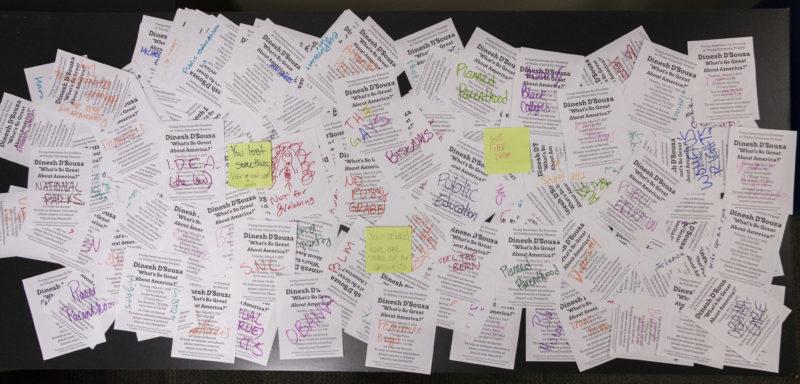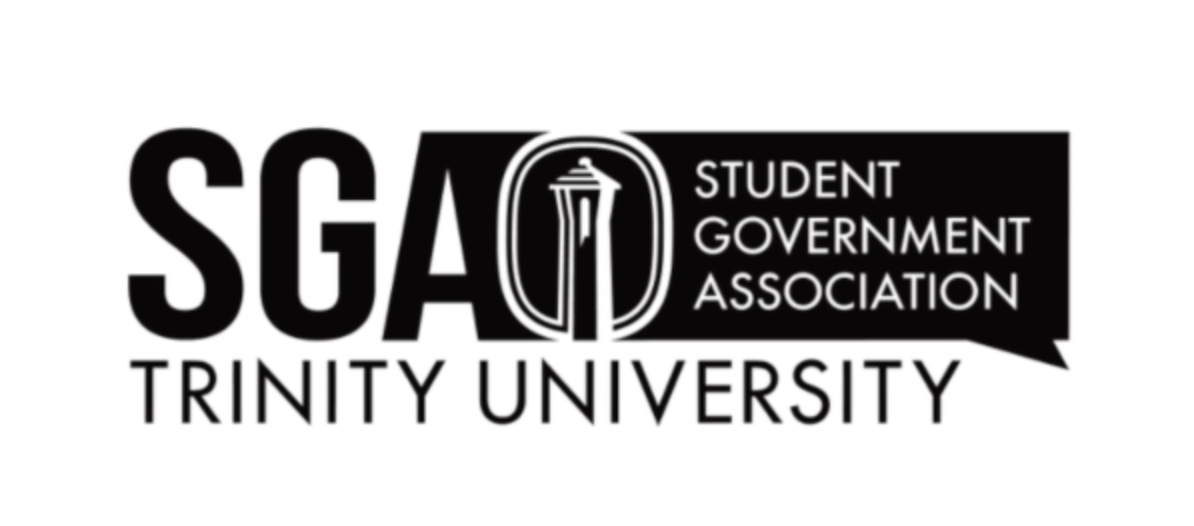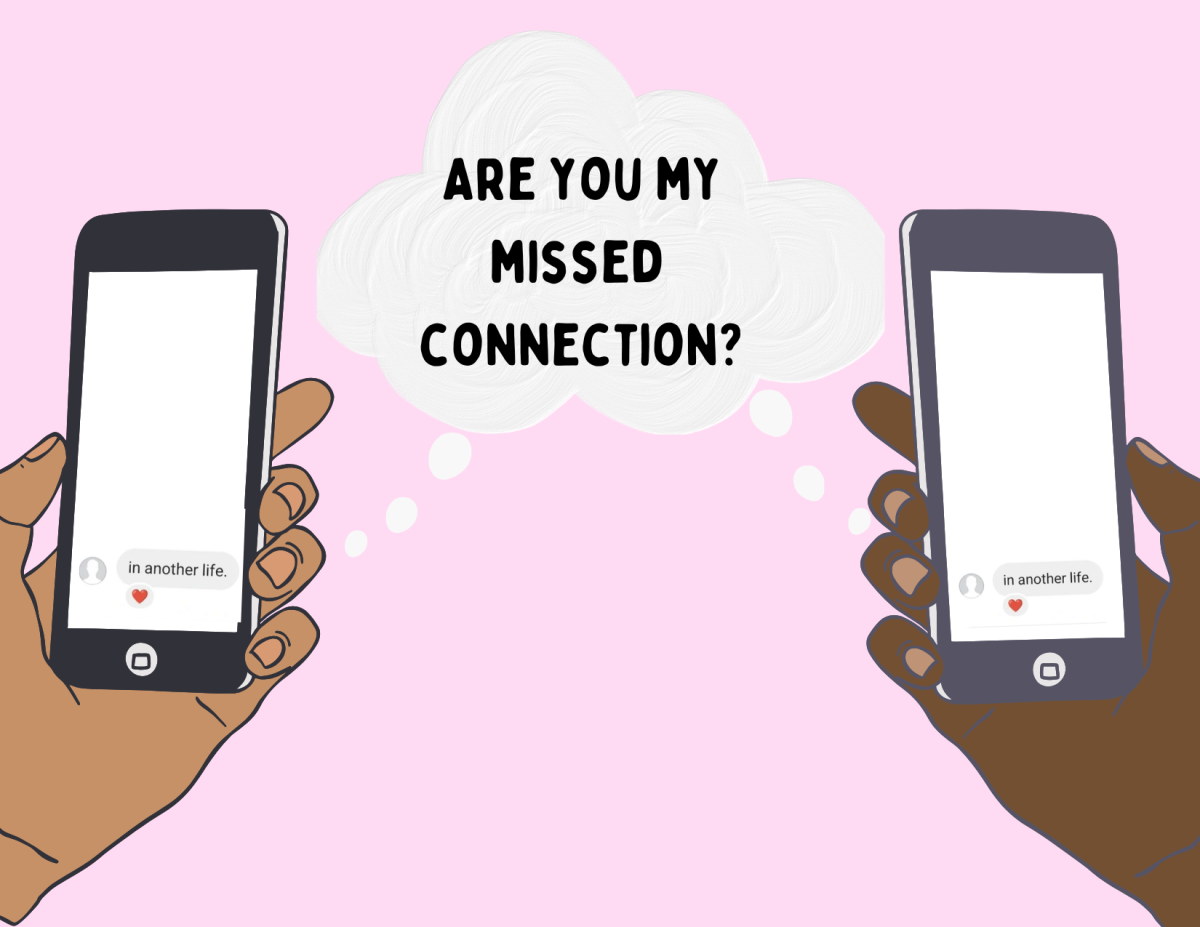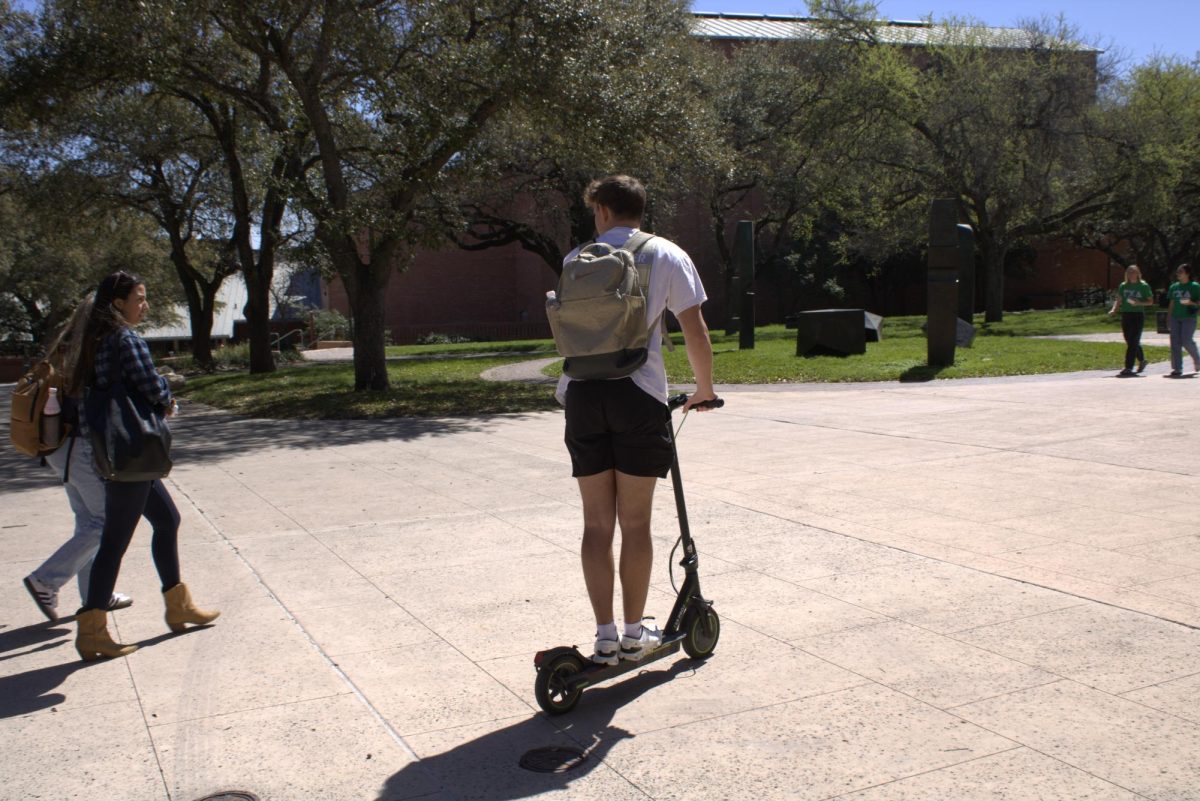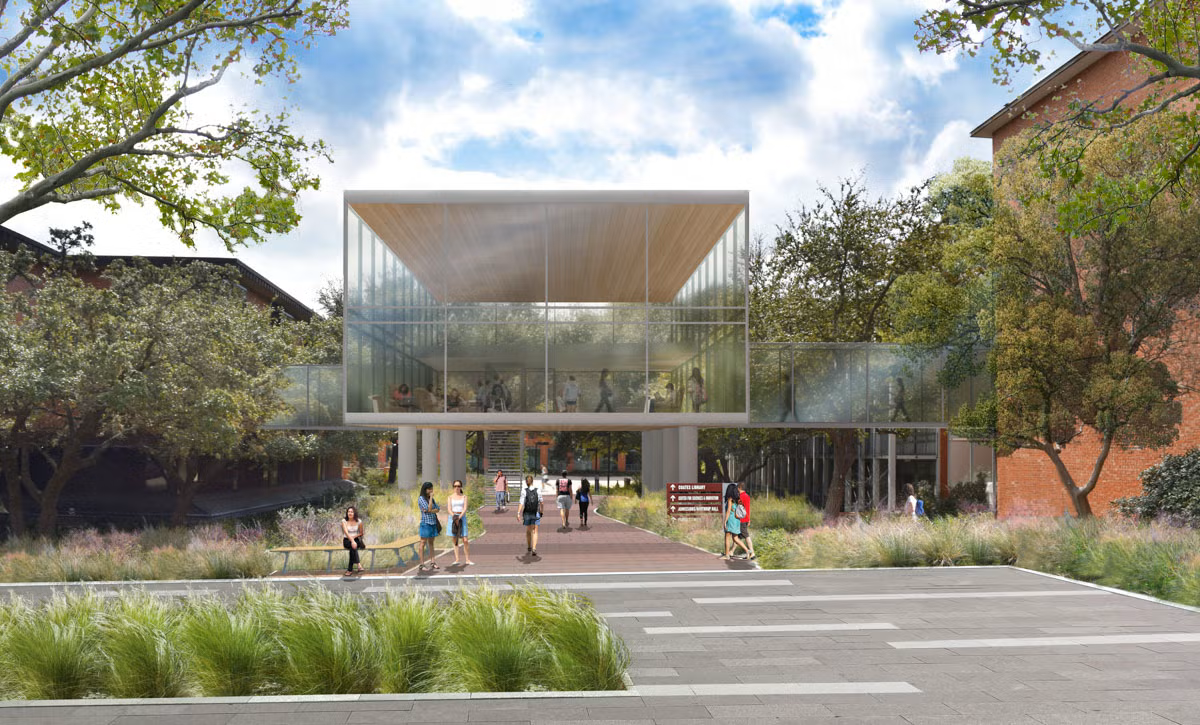Student response to upcoming speaker ignites debate over harassment, respect
Dinesh D’Souza, conservative political commentator and filmmaker, will be delivering a free public lecture titled “What’s So Great About America?” to Laurie Auditorium at 7 p.m. next Tuesday, March 7.
Jonah and Manfred Wendt — sophomores and chief officers of Tigers for Liberty, the student organization that invited D’Souza to campus — filed harassment reports with Trinity University police after students upturned American flags outside of their room and returned promotional flyers with messages for the brothers last Saturday. Students, media outlets and university officials have commented on the situation.
D’Souza details
Tigers for Liberty wanted to bring D’Souza to campus in order to bring the campus in conversation with other politically inclined citizens of San Antonio.
“When we host lectures, we don’t just host them for students. We host them for the entire community,” Jonah said. “Dinesh is a well-known figure in the conservative community, so hosting him is an opportunity to connect with folks, both students and from outside of Trinity.”
Jonah Wendt explained that the process to bring D’Souza to Trinity began over a year ago, when he met D’Souza at a conference in Washington, D.C.
“Last year, I had the opportunity to attend the Conservative Political Action Conference in D.C., and while I was there, I personally asked [D’Souza] to come speak here,” Wendt said. “He replied, ‘Go talk to the Young America’s Foundation.’ ”
The Young America’s Foundation, an outreach organization promoting conservative activism for youth and young adults, offered to fund half of the $10,000 honorarium for bringing D’Souza. Tigers for Liberty acquired $6,000 from Student Government Association (SGA) in November last year: $5,000 to pay for the rest of D’Souza’s honorarium, and $1,000 to cover the cost of advertising and security.
SGA heard the funding request on Nov. 7 and granted approval on Nov. 21. Samy Abdallah, junior class senator on SGA, explained that student government processes many funding requests one at a time in the order that they are submitted.
“We only have so much time that we can spend in a session,” Abdallah said. “We’re able to hear a lot of requests, discuss them and vote on them, but sometimes funding requests are not able to be fully [considered] until weeks after their initial proposal was heard.”
Students push back
Jonah described the resistance he experienced as a result of organizing the lecture.
“[Last] Friday night, around 8 p.m., I left my dorm with Manfred, [first-year] Taryn Woodall and a member of University of Incarnate Word College Republicans representative, and we went around putting flyers on doors,” Jonah said. “This is pretty status-quo for most organizations. We hit every single door on campus, we think. We came back to my room around 9:30, 10 o’clock-ish, and we realized there were about 50 flyers shoved back underneath my door with this note that was like, ‘Hey, we think you lost this. We returned them.’ ”
Jonah said that a resident advisor attempted to confront one student who was removing the flyers, but the student fled the scene before being identified or apprehended.
“I woke up this morning [Saturday] and noticed that both of our American flags outside our room were turned upside-down,” Jonah said. “There was a stack of flyers attached to my brother’s door.”
In an interview with the San Antonio Express-News, Jonah called the move “a clear attempt at intimidation.” That day, Jonah filed a harassment report with university police and notified Residential Life so that the incident would be documented.
Jonah admitted that he wasn’t surprised by students’ reactions.
“This is pretty status-quo for most conservative lectures on college campuses,” Jonah said. “There’s always someone who decides, ‘I’m going to do my little part and push back against those evil conservatives!’ This kid decided to pick up 228 flyers and write notes on them and returning them to our dorm.”
Jonah displayed some of the “liberal yelling-points” written on the flyers underneath the title of the lecture, “What Makes America So Great?”: ‘black people,’ ‘tacos,’ ‘immigrants,’ ‘freedom of speech’ and ‘Muslims’ were among the phrases written on the flyers.
“Yeah, I kind of agree with you guys,” Jonah said.
Sharon Jones-Schweitzer, assistant vice president for external relations, told the Rivard Report that university police did not find any of the messages to be threatening.
Fostering a diversity of dialogues
Jonah took to the Young America’s Foundation website and penned an editorial on the situation.
“Nothing seems to get to a liberal quite like a conservative voicing their opinion,” Jonah wrote. “The leftists can tear down our flyers, they can deface our flags and they can attempt to intimidate us, but the Young Americans for Freedom at Trinity University will continue to boldly advance freedom.” He also lauded the university administration for not attempting to censor conservative voices.
Jonah also spoke to a reporter from “Campus Reform,” a self-proclaimed watchdog for political bias in American universities.
“These leftist intimidation tactics will not phase us,” he said.
The incident resulted in a number of responses from media outlets and university officials. Nick Santulli, president of SGA, was critical of students’ failure to live up to standards of civil discourse.
“In order to build trust in a community, you shouldn’t obstruct the speech of people who disagree with you,” Santulli said. “You shouldn’t tear down their materials and get in the way of marketing their event. At the same time, you shouldn’t try to demonize opposing views. I think that goes for both sides; everyone can improve.”
Jones-Schweitzer penned a response to heated debates in the Trinity University Alumni group on Facebook.
“The University promotes civil discourse and respectful listening,” Jones-Schweitzer wrote. “In an era of polarization and social media hype, it is more important than ever that we keep our focus on the goal of supporting young adults in their journey, which includes wrestling with challenging political ideas, learning to shape their own reasoned statements and learning how to move from emotion reactions to effective actions in the world.”
Deneese Jones, vice president of academic affairs, sent an email to Trinity faculty and staff, asking them to urge students to either attend and ask questions of D’Souza, not attend or engage in respectful dialogue with attendants afterward.
“While we must continue to work with all student groups,” Jones wrote, “We do so with the commitment that what makes Trinity University strong is an openness to ideas, the ability to debate, and the desire to have authentic relationships across ideological or political differences.”
David Tuttle, dean of students, authored a blog post and email to students emphasizing the value of listening to viewpoints one disagrees with.
“It isn’t easy speaking up sometimes,” Tuttle wrote. “But that’s what college discourse is all about. The last thing we need is to keep driving hate into the shadows. When we do, it doesn’t go away. It just hides.”
Harassment or oversensitivity?
San Antonio Current staff reporter Alex Zielinski took umbrage with Tuttle’s response in an opinion editorial published Tuesday. She ended her column with a rhetorical question:
“Does that mean Trinity students should now expect campus hate to be displayed where everyone can see it?”
In a Wednesday interview, Tuttle explained his position.
“That’s commentary about people who are bigoted, misogynistic, racist, homophobic. Those people are out there,” Tuttle said. “Our students have a great opportunity to confront individuals who are basically diminishing their dignity. I think we shouldn’t rob our students of that opportunity. I’m not sure why the Current would take exception to that, unless they just didn’t understand.”
Not all responses to the incident were sympathetic to Tigers for Liberty. Robby Soave, associate editor for popular libertarian media website Reason.com, accused Jonah of sensitivity and “snowflakery” for filing the harassment claim.
But Tuttle notes the role of a university in attending to its students’ concerns.
“I respect the call. If they felt that it was harassing, then that’s how it was received by them. It’s not for me to judge how it was felt,” Tuttle said. “I don’t think these are the only things they have dealt with; SGA posters with Manfred on them are consistently defaced. A few people seem to be obsessed with whether it’s harassment or not. I think if students object to the way that they’re treated, we need to take that seriously.”
“Ultimately I feel like it’s up to the people who received the flyers to make the judgment of whether they were harassed or not. I don’t feel comfortable denying their experiences,” Santulli said.
Free speech and fear: a balancing act
Some are critical of the university for hosting speakers like D’Souza and earlier controversial speakers, most recently former Breitbart editor Milo Yiannopolous and Heritage Foundation research fellow Ryan Anderson, who spoke at Trinity in 2016 against microgressions and same-sex marriage, respectively.
Trinity alumna Abby Mangel, ’14, criticized Tuttle’s position in an email statement.
“Dean Tuttle is dismissing the gravity of fear,” Mangel wrote. “[Milo Yiannopolous] is infamous for espousing transphobic beliefs (among many other problematic affronts). When Milo was invited to Trinity, the administration effectively told transgender students that their personhood was up for debate, that they had to merit the fact of their own existence. Hearing something like that isn’t just uncomfortable or offensive — it’s harmful.”
Mangel explains why affronted students shouldn’t be expected to challenge bigotry expressed at college campuses.
“In the fallout of that [Ryan Anderson] episode, the dean actually congratulated students on challenging Anderson’s blatant homophobia. But, here’s the deal: it’s not a LGBT person’s responsibility to profess human decency,” Mangel wrote. “At the end of the day, the administration chose to promote someone who directly attacks civil liberties. When called into question, the dean attempted to excuse the decision with an empty pat on the back. It’s the definition of performative allyship. I think it signals a disturbing development on Trinity’s campus that we shouldn’t take too lightly.”
Tuttle responds that students have a number of strategies at their disposal for dealing with such controversial speakers.
“Nobody’s asking students to defend themselves,” Tuttle said. “Our students could say, ‘We’re so offended by Dinesh D’Souza that we’re boycotting.’ That’s a different strategy: then you’re not facing the ideas that you don’t like. To me, the important thing is to give students the opportunity to choose how to respond and to expose them to different viewpoints. If [a lecture is] going to offend somebody, then they shouldn’t go, no question. But what a great opportunity to stand up for oneself and to fight back. Why should we take that opportunity away?”
Tuttle suggests that controversial speech should be censored only if it crosses a line: inciting violence.
“We need to be careful about someone who is espousing violence versus someone who is saying things that offend people. To me, that’s the tipping point: if people are feeling physically intimidated.”
Santulli expressed concern for balancing students’ wellbeing and students’ free speech rights on campus.
“To say [D’Souza] can’t come to campus because [some students] feel marginalized by it impedes on someone else’s right to bring whatever speaker they want to campus,” Santulli said. “We’re trying to balance everyone’s rights here.” He suggests that students should try to bring more liberal speakers to campus.
Aaron Delwiche, professor of communication, notes that provocative speakers associated with the left have visited Trinity, among them Ward Churchill, W. Kamau Bell and Michael Moore. He believes that challenging controversial speakers is more effective than ignoring them.
“Especially in this climate of intolerance and hate, when so many people are fearful and there is so much anger being expressed on talk radio and comments forums on the internet, it’s vital that we have conversations about these issues,” Delwiche said. “[Trinity students] know how to push back in a question-and-answer session. … It’s much more dangerous to give people like D’Souza, Milo or [Ryan Anderson] more power by trying to silence them. It’s very counterproductive.”
He suggests ways for students to engage in respectful dialogues.
“I think Jonah and his colleagues in [Tigers for Liberty] wanted to bring this speaker to campus partly to have a conversation. It’s much more effective to have a conversation than a free speech incident,” Delwiche said. “I thought [students responded well to] Milo, a completely disgusting figure for so many reasons. There was chalk outside, people showing their protest; the same thing happened with [Ryan Anderson], but they were allowed to speak. I think that’s very powerful.”
D’Souza’s lecture is free and open to the public, but more than 2,000 attendees have registered online already. Regardless of registration, seats are available on a first-come-first-served basis. Laurie Auditorium’s doors open to attendees at 5:30 p.m. on Tuesday.

